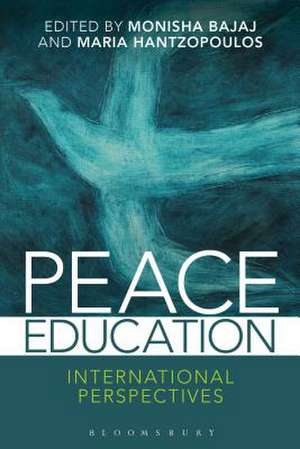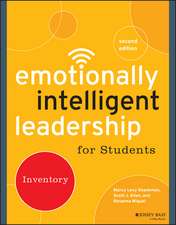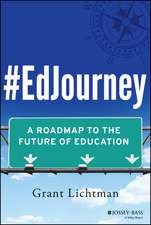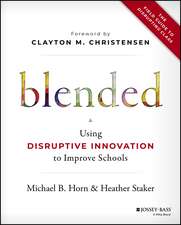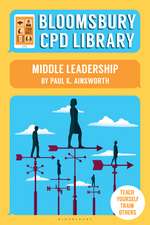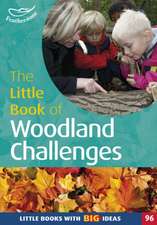Peace Education: International Perspectives
Editat de Professor Monisha Bajaj, Maria Hantzopoulosen Limba Engleză Paperback – 27 ian 2016
| Toate formatele și edițiile | Preț | Express |
|---|---|---|
| Paperback (1) | 240.04 lei 6-8 săpt. | |
| Bloomsbury Publishing – 27 ian 2016 | 240.04 lei 6-8 săpt. | |
| Hardback (1) | 892.16 lei 6-8 săpt. | |
| Bloomsbury Publishing – 27 ian 2016 | 892.16 lei 6-8 săpt. |
Preț: 240.04 lei
Preț vechi: 273.99 lei
-12% Nou
Puncte Express: 360
Preț estimativ în valută:
45.94€ • 47.78$ • 37.92£
45.94€ • 47.78$ • 37.92£
Carte tipărită la comandă
Livrare economică 14-28 aprilie
Preluare comenzi: 021 569.72.76
Specificații
ISBN-13: 9781474233699
ISBN-10: 1474233694
Pagini: 304
Dimensiuni: 156 x 234 x 18 mm
Greutate: 0.48 kg
Editura: Bloomsbury Publishing
Colecția Bloomsbury Academic
Locul publicării:London, United Kingdom
ISBN-10: 1474233694
Pagini: 304
Dimensiuni: 156 x 234 x 18 mm
Greutate: 0.48 kg
Editura: Bloomsbury Publishing
Colecția Bloomsbury Academic
Locul publicării:London, United Kingdom
Caracteristici
Global case studies presented offer a comprehensive understanding of peace education efforts in Israel-Palestine, Cyprus, Northern Ireland, Trinidad, India, Ecuador, Kenya and the USA
Notă biografică
Monisha Bajaj is Associate Professor of International and Multicultural Education at the University of San Francisco, USA, where she directs the Human Rights Education MA. She is the editor of the Encyclopedia of Peace Education (2008) and author of Schooling for Social Change (2012), winner of the Jackie Kirk Outstanding Book Award of the Comparative and International Education Society (CIES). Maria Hantzopoulos is Associate Professor of Education at Vassar College, USA, where she is the coordinator of the Adolescent Education Certification Program. She is co-editor, with Alia Tyner-Mullings, of Critical Small Schools (2012).
Cuprins
Introduction: Theory, Research and Praxis of Peace Education, Monisha Bajaj (University of San Francisco, USA) and Maria Hantzopoulos (Vassar College, USA)Part I: Educating for Peace in Conflict and Post-Traumatic Contexts1. Emotion, Trauma and Critical Pedagogy: Implications for Critical Peace Education, Michalinos Zembylas (Open University of Cyprus, Cyprus)2. Building Peace: The Opportunities and Limitations of Educational Interventions in Countries with Identity-Based Conflicts, Karen Murphy (Facing History and Ourselves, USA), Sean Pettis (Corrymeela Community, Northern Ireland) and Dylan Wray (Shikaya, South Africa)3. Experimenting with Integrated Peace Education: Critical Perspectives in the Israeli Context, Zvi Bekerman (Hebrew University of Jerusalem, Israel)Part II: National Landscapes for Peacebuilding and Education 4. Peace Education and Peacebuilding Across the Conflict Continuum: Insights from Lebanon, Zeena Zakharia (University of Massachusetts, USA)5. Peace Education in Crisis Settings: Insights and Lessons Learned from Kenya, Mary Mendenhall and Nivedita Chopra (Columbia University, USA)6. In the Gaze of Gandhi: Peace Education in Contemporary India, Monisha Bajaj (University of San Francisco, USA)Part III: Navigating Structures of Violence 7. Uncertainty, fluidity and occupying spaces in-between: Peace education practices in Mindanao, the Philippines, Lindsey Horner (University of Sussex, UK)8. Lingering Colonialities as Blockades to Peace Education: School Violence in Trinidad, Hakim Williams (Gettysburg College, USA)9. Teachers as Agents of Peace: The Role of Educators in Interrupting Youth Involvement in Urban Violence in Guayaquil, Ecuador, Maria Jose Bermeo (Columbia University, USA)Part IV: Peace by Piece: Approaches and Models for Peace Education10. Beyond American Exceptionalism: Centering Critical Peace Education in US School Reform, Maria Hantzopoulos (Vassar College, USA)11. Nurturing and Growing the 'Ceeds' of Peace: A Peacebuilding Model for Educators, Maya Soetoro-Ng (University of Hawai'i, USA) and Kerrie Urosevich (University of Hawai'i, USA)12. Promoting Peace through Children's Media: The Case of Sesame Workshop, Mathangi Subramanian (Mahatma Gandhi Institute of Education for Peace and Sustainable Development, India), June Lee (Sesame Workshop, USA) Lilith Dollard (Sesame Workshop, USA) and Zainab Kabba (Oxford University, UK) Conclusion: Critical Directions for Peace Education, Maria Hantzopoulos (Vassar College, USA) and Monisha Bajaj (University of San Francisco, USA)
Recenzii
The volume helpfully highlights the need to move beyond conventional framings of peace that are confined to the classroom, and instead to consider localized and contextualized approaches that address questions of social justice . This book will be of interest to agencies that design education intervention programs, often in collaboration with government institutions; NGOs involved in the education sector; curriculum designers and teachers of history and civics; and, finally, researchers who are rethinking what peace education entails.
A valuable contribution to the field, charting voyages into peace education on a global scale and drawing rich, locally contextualised maps of the possibilities and tensions therein. The diversity of the contexts examined and the combination of academic critique with practical guidance will make it useful for a wide range of audiences, from university professors, peace researchers and students to classroom teachers and policymakers.
This collection of essays and qualitative case studies provides an excellent introduction to the field of peace education in general and the idea and practice of critical peace education in particular. It offers the reader an international, comparative and grounded insight into the foundational questions of peace education as it is conceptualized and implemented in diverse contexts around the world, especially within conflict and post-conflict societies. It is one of the finest volumes on critical peace education available. It will be ideal for general and introductory courses in peace education. The book deserves a wide readership.
Today, when profound conflicts continue to spread globally, no book could be more timely than this important new title about peace education and the latest developments in theory and practice. In each of the richly nuanced and localized studies, Hantzopoulos, Bajaj and colleagues showcase the potential to transform individual and collective lives when peace education, in all its variations, centers a critical and justice orientation to teaching and learning. With this book we are presented with indispensable conceptual and pedagogical tools, and for a better tomorrow we are called upon to act.
This well written book gives us a view of attempts to enliven peace education all over the world. It will be of particular interest to those concerned with the contributions of critical theory to peacemaking.
The theoretical and practice-oriented essays constitute a much need guidebook for those of us wanting more understanding, trying to "connect the dots" of seemingly unconnected particulars, and engaging in one kind of "peace work" or another. Peace Education: International Perspectives is impactful, comforting and inspiring, and much needed for the times!
Peace Education: International Perspectives offers a thought-provoking and nuanced alternative to the often-oversimplified macro-institutional approaches to peace education. Editors of and contributors to the volume ask us to imagine human(ist) potentialities for the possibility of sustainable peace. With piquant analysis of contemporary issues in the field they also urge us to interrogate the entrenched Eurocentric normative frameworks in order to grapple with complex questions related to the intertwined dynamics of violence and peace at micro as well as macro levels. Coupling theoretical visions with practical insights, this volume will be a vital resource for students and teachers of peace education.
A valuable contribution to the field, charting voyages into peace education on a global scale and drawing rich, locally contextualised maps of the possibilities and tensions therein. The diversity of the contexts examined and the combination of academic critique with practical guidance will make it useful for a wide range of audiences, from university professors, peace researchers and students to classroom teachers and policymakers.
This collection of essays and qualitative case studies provides an excellent introduction to the field of peace education in general and the idea and practice of critical peace education in particular. It offers the reader an international, comparative and grounded insight into the foundational questions of peace education as it is conceptualized and implemented in diverse contexts around the world, especially within conflict and post-conflict societies. It is one of the finest volumes on critical peace education available. It will be ideal for general and introductory courses in peace education. The book deserves a wide readership.
Today, when profound conflicts continue to spread globally, no book could be more timely than this important new title about peace education and the latest developments in theory and practice. In each of the richly nuanced and localized studies, Hantzopoulos, Bajaj and colleagues showcase the potential to transform individual and collective lives when peace education, in all its variations, centers a critical and justice orientation to teaching and learning. With this book we are presented with indispensable conceptual and pedagogical tools, and for a better tomorrow we are called upon to act.
This well written book gives us a view of attempts to enliven peace education all over the world. It will be of particular interest to those concerned with the contributions of critical theory to peacemaking.
The theoretical and practice-oriented essays constitute a much need guidebook for those of us wanting more understanding, trying to "connect the dots" of seemingly unconnected particulars, and engaging in one kind of "peace work" or another. Peace Education: International Perspectives is impactful, comforting and inspiring, and much needed for the times!
Peace Education: International Perspectives offers a thought-provoking and nuanced alternative to the often-oversimplified macro-institutional approaches to peace education. Editors of and contributors to the volume ask us to imagine human(ist) potentialities for the possibility of sustainable peace. With piquant analysis of contemporary issues in the field they also urge us to interrogate the entrenched Eurocentric normative frameworks in order to grapple with complex questions related to the intertwined dynamics of violence and peace at micro as well as macro levels. Coupling theoretical visions with practical insights, this volume will be a vital resource for students and teachers of peace education.
